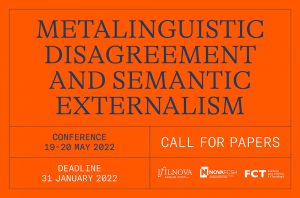The primary goal of this group is to investigate problems of rationality, normativity and values, as manifest in human uses of language and argumentation. Naturally, IFILNOVA’s general thematic concern with values and their role in human practices has an obvious and structuring presence in the activities and research carried out by the group. PHILA approaches language in its semantic and pragmatic complexity, studying issues such as the nature of disagreements (evaluative, metalinguistic, substantive/verbal disagreements), criteria for rational argumentation, strategic aspects of speech acts (especially argumentative speech acts), evaluative language, practical reasoning and decision making, forms of meaning and understanding, and social and political importance of speech acts.
While these are classical topics of philosophical importance, the group treats them as present challenges with social significance. Our aim is to better understand problems such as rational public decisions, misunderstandings, abuses of public language and polylogical (multi-party) discussions, to name just a few. Accordingly, the projects developed by our members have both a strong theoretical import and applied relevance, reinforced through local, national, and international collaborations. In this way, PHILA contributes to current debates in the philosophy of language, argumentation theory, speech act theory, conceptual ethics, metaethics, and practical philosophy.
We are confident that PHILA is on course to becoming nationally and internationally recognisable and that its contributions and outputs will have a lasting impact on multiple disciplinary fronts. An excellent and recent illustration of the group’s potential is the first major PHILA event, a two-day international conference on Metalinguistic Disagreement and Semantic Externalism that took place in May 2022. The conference brought together various of the most preeminent voices in the fields of conceptual ethics and metasemantics, and generated important contributions and discussion that are now in the process of being refined, compiled and completed for a special issue in a top-tier philosophy journal.
While PHILA is of recent origin, it very naturally came to aggregate and host research lines, projects — The European network for Argumentation and Public PoLicY analysis (APPLY), ANTIDOTE: ArgumeNtaTIon-Driven explainable artificial intelligence fOr digiTal mEdicine — and activities/regular events — IFILNOVA’s Open Seminar, The ANTIDOTE reading group on Explainable AI & Inference to the Best Explanation — already ongoing at the moment of the group’s creation.
PHILA’s members have recently published their work in journals such as: Argumentation, Australasian Journal of Philosophy, Erkenntnis, Informal Logic, Inquiry, Linguistics and Philosophy, Mind and Language, Organon F, Philosophical Studies, Synthese, TOPOI.




